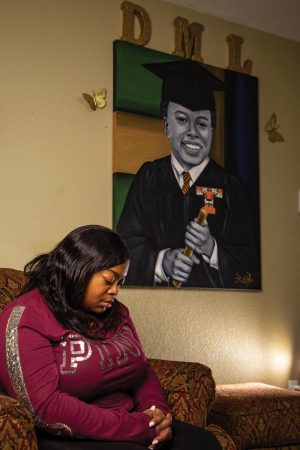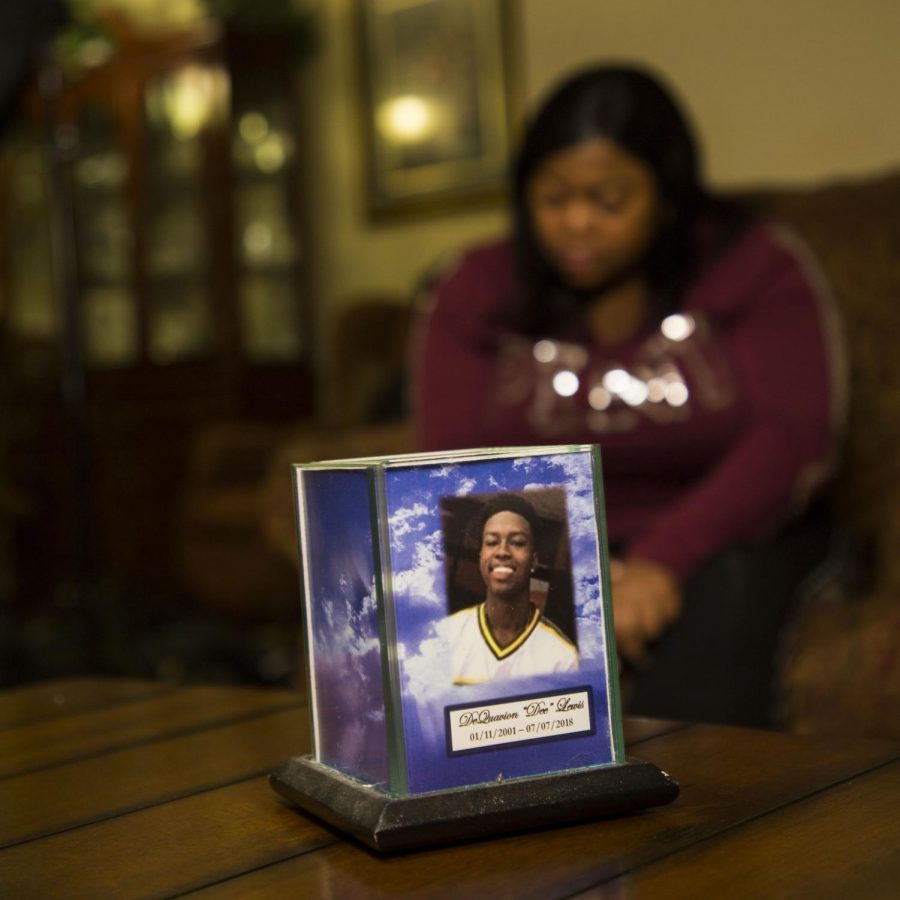Photo by Margaret Debenport
Her heart still beats
Mother recounts son’s experience with heart condition
February 12, 2020
He is everywhere. He is embroidered on the quilt draped across the sofa, memorialized in the gallery of photos hung on the wall and, most strikingly, the subject of the massive portrait on the wall. A painting of him in his cap and gown. A senior who never lived to wear his.
DeQuavion “Dee” Lewis died at age 17 of Long QT Syndrome, a heart defect that extends the amount of time between electric currents recharging the heart’s beat, often resulting in fainting or chest pains, but sometimes resulting in sudden cardiac arrest and death. The condition is especially worsened by intense physical activity.
“Dee played basketball every day just about. I mean, for hours,” Dee’s mother, Carla Lewis, said. “He was a neighborhood basketball star.”
Dee’s hours of physical activity didn’t end with his consistent basketball playing. His obsession with fitness was rooted in his childhood and branched out into his work life. In elementary school, Dee used to be chubby.
“I’m not going to be like that anymore,” he would say.
So he worked out constantly and played basketball for hours everyday.

“He just made sure he wasn’t going to get big anymore,” Lewis said. “That’s probably where his enlarged heart came from.”
Autopsy results revealed that, in addition to LQTS, he had a condition often referred to as “athlete’s heart,” a condition in which the heart muscle grows to keep up with the growing muscles in the rest of the body, resulting in a lower resting heart rate than normal.
In addition to constant workouts, Lewis said Dee worked at Super One grocery store “outside in the heat, pushing the buggies and toting groceries.” Throughout all the intense physical work, however, Dee never complained.
“Dee didn’t worry people,” Lewis said. “If something went wrong, he would just try to push through.”
He did sometimes complain of chest pain.
“Yeah, my chest is hurting, but I’m OK,” he told her. “Can I go to a friend’s house?”
Lewis would worry. “Are you OK? Are you sure?” she asked. She even wanted to take him to an urgent care facility.
“Nah, mom. I’m good. I’m OK,” Dee would reply, asking her to just bring him allergy medicine.
“Well, allergy medication is not good for people with LQTS,” Lewis said.
Lewis left on a plane for New York, unaware that her vacation would be cut short. She laid down, but woke up to chaos reaching her from thousands of miles away.
“They’re working on him,” Lewis’ sister told her in a frantic phone call.
“Working on who?”
“They’re working on Dee.”
Lewis didn’t understand what they were talking about, thinking Dee had a car wreck because he was a beginner driver.
“Then I talked to one of my bosses who worked [at the hospital],” Lewis said. “She said, ‘We’re doing all we can.’”
Soon after, she received news that changed her life.
“Maybe 10 minutes later, they said, ‘He’s gone,’” Lewis said.
In the days that followed, guilt consumed Lewis. She wondered how she could be a nurse and not have seen what was going on with her son. As Dee seemed completely absent of health issues, Lewis searched for answers.
“I’m not understanding how a perfectly healthy kid just drops like that,” Lewis said.
An autopsy discovered that Dee went his whole life with a rare variation of LQTS. This variation was almost undetectable until death, but could have been caught using blood tests and electrocardiograms.
“I did research on it, and his kind is only 0.1% [of those found], and it’s usually diagnosed when someone dies,” Lewis said. “When I took [my other son] to get his physical after this happened they did an echo, an EKG and blood work. The echo would’ve shown where his heart was large, and the EKG sometimes can be helpful with diagnosis only if it had that rhythm at the time they were doing it.”
Lewis has shared her story in hopes of helping other mothers with young athletes that may have heart conditions. After posting on Facebook, Lewis said another mother contacted her about her son’s problems.
“She said, ‘Do you think I need to wait to take him or I need to take him now [to be tested],’” Lewis said. “I said, ‘You need to take him to the ER.’”
The boy was diagnosed with an enlarged heart and was prescribed medication.
“She follows up every now and then,” Lewis said. “She just says, ‘Thank you for saving my son.’”
As far as her advice to other parents goes, paying attention to even the smallest warning signs is Lewis’ number one piece.
“If I had to do it all over again, I would take him [to the doctor when he said his chest was hurting],” Lewis said. “Maybe they would’ve done their chest X-ray and found it.”
LQTS can be treated with medications and possibly an implantable cardioverter-defibrillator.
“You know, it would’ve given him more time,” Lewis said.
Lewis is also an outspoken advocate for enhancing the physical system for student athletes.
“It’s important especially for athletes. We’ve had plenty of physicals when they go for their checkup,” Lewis said. “Those physicals don’t really do anything. You know, they check your reflexes, they don’t really do a lot that you need them to do when you get the physical.”
There are a multitude of online resources available for parents and students to use to assess their heart health, including questionnaires about signs and symptoms. Lewis advises other parents to use these with their children.
“If they answer so many questions yes, you need to go get checked out, or something that will prompt them to say, ‘Hey, you need to look at this a little further,’” Lewis said.
Heart conditions are going undetected in all groups of people, beyond student athletes and teenage boys. Lewis is continuing to raise awareness.
“I’ve been reading a lot of stories since Dee passed,” Lewis said. “And there’s been a whole lot more kids that have just dropped. Not all of them are athletes. They’re kids, you know.”

